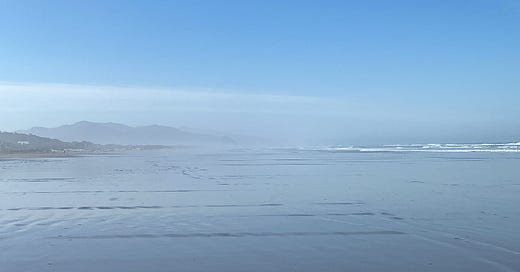Writing Into Structure
Sometimes it takes 20,000+ words and a friend to figure out how a book should unfold
Last month, a friend and I decided to start our own two-person workshop, submitting roughly 2,000 words each week. I would say - and Leslie, maybe you agree too? - that it was a long time coming. We met as writers, are familiar with each others work, and trust the other to show up (honestly, key to any writing group).
There are a lot of great reasons to join - or start - a writing group: accountability, encouragement, and structure being the big three. For me, though, I was particularly looking forward to having someone who knows what I’m trying to do look at my work and tell me if I’m, well, doing it. Which, as I learned in our first meeting, I was not.
Structure, and how to find it, is one of the most asked about elements of writing that I’ve encountered in workshops. Also, how to write about people. The latter because it’s uncomfortable writing about people who either disagree with your recollection of events or would rather you stay silent. And the former because when it comes to a book, the length of the project makes the structure more difficult to see. Especially - and this is an assumption based on my own, limited personal experience - with memoir because you’re bringing all of you to the table when you sit down to write. How do you parse through all of the highs and lows, and identify what you need to create a compelling narrative?
I understand the fixation on structure. The minute I can see how a story will unfold is the minute I’m able to let go of distracting details, narrow down scenes and memories, generate momentum, and construct a focused piece. It’s the key to opening a story up while simultaneously silencing the noise. But it’s elusive. And sometimes, as I’ve learned, the only way to find it is to write into it.
Up until that meeting with my friend, I’d written roughly 20,000 words, not including all that I’d typed out before that I didn’t know related to the story pre-last December. Yet none of it read quite right. Each piece was a half-formed thing and none of the fragments spoke to each other. Or they did, but instead of a fluid conversation held between an intimate group, they shouted at each other, angry that they’d all arrived at the 10-way stop at the same time. Nobody knows whose turn it is but it sure as hell isn’t theirs. stopgostopgostopgo, scream fucking gooooo! at the car across the way, then hit the gas.*
My friend saw that. She’d also heard about it over countless voice notes. Which is to say that she kept that in mind while reading the piece. As a result, we were able to identify that it wasn’t necessarily the elements of the story but the organization of them that was stifling the unfold. And just like that, I spiraled. Even though I know that all writing serves a purpose, I couldn’t help but feel that everything I’d written up until that moment was useless. That I’d put in all that work only for it to come out all wrong.
The task of reorganizing overwhelmed me. I had a deadline shortly after that involved those specific pages. I believed there wasn’t enough time to change what needed to be changed. And the resulting discouragement from the above in combination with that deadline was getting to me. So I did what I’d seen other writers do - I printed the draft out and took a pair of scissors to it. I cut clean horizontal lines between paragraphs then played around with the resulting pile. I put the beginning and end where they were meant to go. I lifted one timeline from the draft completely and homed in on the other. I separated the active scenes from the present day reflections, setting the latter to the side for a later chapter. And slowly, the story began to click into place.
After we met, I realized that I’d been avoiding the book’s structure. It scares me, the task of it and also what it requires of me. There’s a particular anxiety with this project in that it’s a memoir that needs me to write into absence, to recall what I struggle to, or sometimes can’t, recall. The gaps in my memory are so wide sometimes that they frustrate the people around me, or make them sad, as if my lack of remembrance diminishes the significance of whatever moment we shared. And then there are the things I know happened but because I was taught to distrust myself, those memories skitter into the shadows the minute I turn the light on them. But that’s what this book is all about, memory, how it appears and how it lives inside of us. And - despite the momentary frustration above - it’s a relief to have finally arranged the book to fit that experience.
*This 10-way stop may or may not exist in Port Hadlock.




